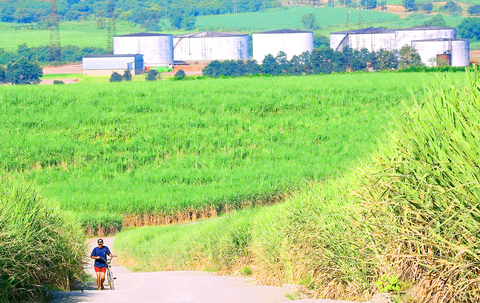Just an hour's drive outside this traffic-choked metropolis where US President George W. Bush will kick off a Latin American tour on Thursday, sugarcane fields stretch for hundreds of kilometers, providing the ethanol that fuels eight out of every 10 new Brazilian cars.
In only a few years, Brazil has turned itself into the planet's undisputed renewable energy leader and the highlight of Bush's visit is expected to be a new ethanol "alliance" he will forge with Brazilian President Luiz Inacio Lula da Silva.
The deal is still being negotiated, but the two leaders are expected to sign an accord on Friday to develop standards to help turn ethanol into an internationally traded commodity, and to promote sugar cane-based ethanol production in Central America and the Caribbean to meet rising international demand.

PHOTO: AP
Across Latin America's largest country, Brazilian media were billing the Bush-Silva meeting as a bid to create a new two-state"OPEC of ethanol," despite efforts by Brazilian and US officials to downplay the label amid concerns that whatever emerges would be viewed as a price-fixing cartel.
Meanwhile, political and energy analysts warned that any agreements reached between Brazil and the US were unlikely to have short-term effects.
And the deal itself could end up largely symbolic because of reluctance by Washington to address a key point of friction: a US$0.14 per-liter US tariff on Brazilian ethanol imports.
"For the Brazilians, the tariff has utmost priority," said Cristoph Berg, an ethanol analyst with German commodities research firm F.O. Licht.
"They will agree with developing biofuel economies around the world, but the first thing they will say is `We want to do away with that tariff," he said.
But no one is expecting Bush to give ground on the tariff.
The politically sensitive issue essentially subsidizes US corn growers who are rapidly ramping up ethanol production amid Washington's encouragement of renewable biofuels to ease US dependence on imported petroleum.
But the visit will help Bush and Lula join forces to promote the politically popular issue of renewable energy simply by gathering in a place where ethanol is king.
At every gas station in the city of 18 million, drivers can fill up with gasoline or ethanol. Ethanol came courtesy of a 1970s decision by former military dictators to subsidize production and require distribution at the pumps.
A 1980s Brazilian fad with cars that ran only on ethanol petered out when oil prices fell in the early 1990s.
But the fuel came back into vogue in 2003 when automakers started rolling out "flex-fuel" cars that run on gasoline, ethanol or any combination of the two.
With international oil prices reaching record highs, Brazilian drivers turned to the cars; most choose ethanol, because it costs about half as much as gas.
The ethanol industry is now making profits like never before amid heavy foreign investment.
Brazil is the world's top exporter, though US ethanol production still surpasses Brazil. Brazil, however, produces it more cheaply.

Nvidia Corp yesterday unveiled its new high-speed interconnect technology, NVLink Fusion, with Taiwanese application-specific IC (ASIC) designers Alchip Technologies Ltd (世芯) and MediaTek Inc (聯發科) among the first to adopt the technology to help build semi-custom artificial intelligence (AI) infrastructure for hyperscalers. Nvidia has opened its technology to outside users, as hyperscalers and cloud service providers are building their own cost-effective AI chips, or accelerators, used in AI servers by leveraging ASIC firms’ designing capabilities to reduce their dependence on Nvidia. Previously, NVLink technology was only available for Nvidia’s own AI platform. “NVLink Fusion opens Nvidia’s AI platform and rich ecosystem for

WARNING: From Jan. 1 last year to the end of last month, 89 Taiwanese have gone missing or been detained in China, the MAC said, urging people to carefully consider travel to China Lax enforcement had made virtually moot regulations banning civil servants from making unauthorized visits to China, the Control Yuan said yesterday. Several agencies allowed personnel to travel to China after they submitted explanations for the trip written using artificial intelligence or provided no reason at all, the Control Yuan said in a statement, following an investigation headed by Control Yuan member Lin Wen-cheng (林文程). The probe identified 318 civil servants who traveled to China without permission in the past 10 years, but the true number could be close to 1,000, the Control Yuan said. The public employees investigated were not engaged in national

CAUSE AND EFFECT: China’s policies prompted the US to increase its presence in the Indo-Pacific, and Beijing should consider if this outcome is in its best interests, Lai said China has been escalating its military and political pressure on Taiwan for many years, but should reflect on this strategy and think about what is really in its best interest, President William Lai (賴清德) said. Lai made the remark in a YouTube interview with Mindi World News that was broadcast on Saturday, ahead of the first anniversary of his presidential inauguration tomorrow. The US has clearly stated that China is its biggest challenge and threat, with US President Donald Trump and US Secretary of Defense Pete Hegseth repeatedly saying that the US should increase its forces in the Indo-Pacific region

ALL TOGETHER: Only by including Taiwan can the WHA fully exemplify its commitment to ‘One World for Health,’ the representative offices of eight nations in Taiwan said The representative offices in Taiwan of eight nations yesterday issued a joint statement reiterating their support for Taiwan’s meaningful engagement with the WHO and for Taipei’s participation as an observer at the World Health Assembly (WHA). The joint statement came as Taiwan has not received an invitation to this year’s WHA, which started yesterday and runs until Tuesday next week. This year’s meeting of the decisionmaking body of the WHO in Geneva, Switzerland, would be the ninth consecutive year Taiwan has been excluded. The eight offices, which reaffirmed their support for Taiwan, are the British Office Taipei, the Australian Office Taipei, the